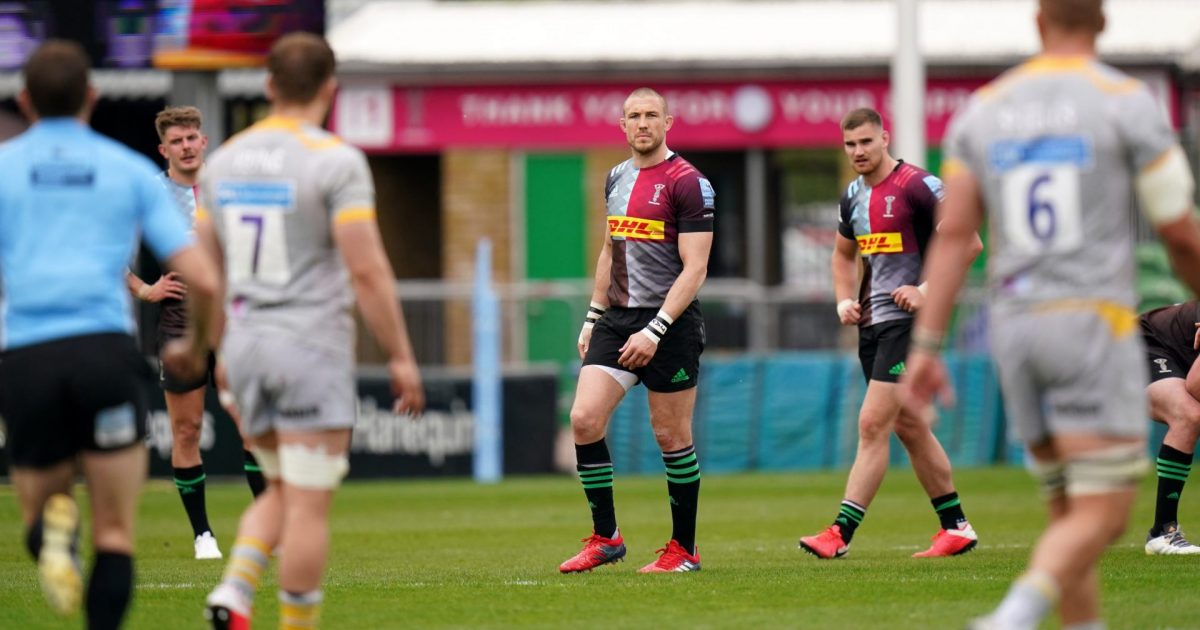Mike Brown might not be finished yet at Harlequins as he launches appeal against six-game ban

Newcastle-bound Mike Brown might not have played his last match for Harlequins after it was decided to appeal the six-game suspension he received last week following his red card for stamping on Wasps’ Tommy Taylor at The Stoop. With a two-year deal agreed to join the Falcons for the 2021/22 season, ex-England full-back Brown was looking forward to a possible Twickenham final send-off with Harlequins after a 17-year stay at the London club.
That plan came unstuck, though, with Brown getting sent off by referee Wayne Barnes on May 9 for an offence deemed to be at the top-end of the foul play list by the independent disciplinary hearing committee that met to consider the player’s fate.
Although the stamp wasn’t found to be intentional, the conclusion was that Brown should miss six matches, the maximum amount of games that Harlequins could potentially have in the rest of this season if they were to go on and reach the June 26 Premiership final.
Brown missed last Saturday’s loss at Leicester and Harlequins have three more regular-season matches left before their likely semi-final appearance. The player’s appeal will be heard next week prior to his club’s next outing.
An RFU statement read: “Harlequins’ Mike Brown is appealing his six-match suspension, which was given for stamping or trampling contrary to World Rugby law 9.12. The appeal will be heard on the evening of Wednesday, May 26, by a new online independent disciplinary panel comprising Philip Evans (chair), with Daniel White and Julian Morris. At the original hearing, Brown accepted the charge against him and was given the suspension by an independent panel of Matthew Weaver (chair), Rob Vickerman and Mitch Read.”
The explanation that Mike Brown provided at his hearing over stamp on Tommy Taylor… and the social media rebuke issued in is defence by the man who banned him for six weekshttps://t.co/isC2Rl7AZH
— RugbyPass (@RugbyPass) May 15, 2021
An eleven-page written judgment on the six-game suspension reported the evidence Brown presented in his defence at the hearing, while a postscript at the end of the document from panel chairman Matthew Weaver hit out at the social media commentary that surrounded the red card and the potential negative follow-up reaction to the ban. “As is clear from the decision above, the panel were unanimous that this was not a deliberate stamp by the player,” wrote Weaver.
“This decision was reached after a detailed review of video footage (from a number of angles and at various speeds, including frame by frame) and hearing from the player directly at length. The player was clearly remorseful and conducted himself throughout the process in a manner that does him much credit.
“Whilst the panel understands that every rugby supporter is entitled to voice their own views on incidents within matches via social media, it is hoped that this decision provides sufficient information for any views expressed on this incident (and indeed on the player) to be informed and based primarily on the facts of the incident. Any abusive comments aimed at the player (whether generally or as a result of this incident) are plainly unacceptable, inconsistent with the values and core principles of rugby and condemned by the panel.”
"There were a lot of bum taps and hugs but it was more about celebrating the emotion of the win"
– What unfolded in Harlequins' dressing room last Sunday after Brown's red card was followed by a dramatic Premiership victory https://t.co/pNixDnUYFD
— RugbyPass (@RugbyPass) May 13, 2021



















































